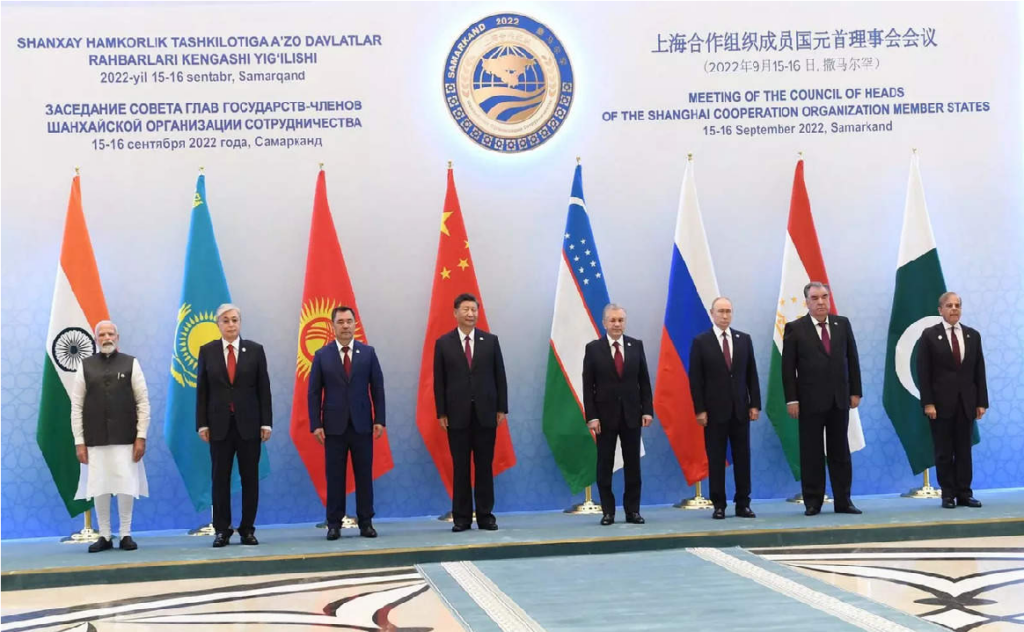
- PM Narendra Modi will not attend the SCO Summit in Astana, Kazakhstan, on July 3-4, 2024. Instead, India will be represented by External Affairs Minister S Jaishankar.
- India’s involvement in the SCO is crucial for addressing regional security threats, particularly terrorism.
- India’s opposition to China’s Belt and Road Initiative (BRI) and its emphasis on counterterrorism and geopolitical balance demonstrate its strategic approach to fostering economic growth and maintaining regional stability.
SCO – Shanghai Cooperation Organisation
The most recent information is that Indian Prime Minister Narendra Modi will not go to the SCO Summit, which is set to take place in Astana, Kazakhstan, on July 3–4. Nonetheless, it has been noted by various media that External Affairs Minister S. Jaishankar, not Prime Minister Modi, will represent India at the Summit. Its strategic ramifications for India and Indian multilateral diplomacy with the SCO have been hotly debated over the years.
The Shanghai Cooperation Organisation: Its Importance
The SCO was established in 2001 as an intergovernmental organization with a primary focus on activities in the fields of security, political, and economic cooperation. It is now made up of eleven countries including China, Russia, Kazakhstan, Uzbekistan, Kyrgyzstan, Tajikistan, India, Pakistan, and Iran. Some of the observer countries that might participate in the future include Belarus and Mongolia. The organization emphasizes the stability and security of the region and has become the centre of discussions on counterterrorism and cooperation.
Historical Relations of India with the SCO
India, in general, has actively engaged in the activities of the SCO since it formally became a member in 2017. India was an observer country since 2005 before its membership. Mr. Modi has attended all the summits of the organization since joining, affirming the place of the organization in India’s strategic and economic interactions in Central Asia. PM Modi provided the initials ‘SECURE’ for India’s interests at the SCO summit held in June 2018, which stands for Security, Economy, Connectivity, Unity, Respect for Sovereignty, and Environmental Protection.
Significance of the SCO: The Shanghai Cooperation Organisation (SCO), established in 2001, focuses on security, political, and economic cooperation among its member countries, including China, Russia, and India.
Why Would PM Modi Choose Not To Attend the Summit?
Several factors may have influenced PM Modi’s decision to skip this year’s summit. Some of the reasons that could have compelled PM Modi to avoid this year’s summit include:
- Parliamentary Session: Official sources state that the current sittings of the parliamentary session in India are a cause of his absence. The new session can bear major statements and debates starting on July 1st.
- Diplomatic Considerations: This tactic of skipping the summit may also be to avoid escalating bilateral relations, especially with Pakistan and China. Due to the current border issues and terrorism, there are high probability of hostile confrontation if they were to meet face-to-face.
- Historical Precedents: Even in 2022, PM Modi participated in a summit but did not have a one-on-one interaction with Chinese President Xi Jinping, showing that direct interaction is not always preferred.
Analyzing India’s Position on Joining the SCO
Engagement with the SCO is important for India’s continued presence and engagement in Central Asia, especially regarding regional security issues such as terrorism. It can also discuss counter-terrorism measures, which is important since India contends with terrorism from Pakistan and border issues with China.
Counterterrorism: India considers the SCO a proper platform for developing counterterrorism initiatives. During a meeting, External Affairs Minister S. Jaishankar highlighted that countering terrorism is one of the primary objectives of the organization.
Geopolitical Balance: India’s participation in the SCO aligns with its policy of multi-alignment, associating with different world powers to ensure good order in the region and foster economic growth.
Terrorism and Diplomacy
India-Pakistan tensions erupted at the summit as both leaders addressed issues of Kashmir and terrorism. Speaking during the United Nations General Assembly session, Pakistan’s Foreign Minister Bilawal Bhutto Zardari called on member states not to politicize the word “terrorism” and condemned New Delhi’s move to end the special status of India-administered Kashmir in August 2019. As a result, Jaishankar described Zardari as the ‘‘chief spokesperson of a terrorism industry’’—a statement that underlined tensions between the two neighbours.
China’s Belt and Road Initiative (BRI)
Attention also shifted to China’s vision through the Belt and Road Initiative. While other members of the SCO supported the BRI, India was the odd one out, voicing concerns about debt-trap diplomacy and sovereignty, specifically referencing Gilgit-Baltistan. India’s vocal isolationism emphasizes its geopolitical mistrust of the BRI’s impact on the openness of connectivity and sovereignty in South Asia.
Russia’s Contribution and Anticipated Involvements
Another member of the SCO is Russia, which has an interest in India’s integration. While PM Narendra Modi will be physically absent at the meeting, he is planning to travel to Russia in mid-July for the annual India-Russia bilateral summit, symbolizing the continuing India-Russia strategic relations beyond the absence at the SCO.
Conclusion
Prime Minister Modi not attending the recent SCO summit is therefore multi-layered and has various nuances relating to internal politics, bureaucracy, international relations, and geopolitics. India actively participates in the SCO and utilizes it for managing regional security threats and deepening cooperation with Central Asian states. India reassures itself and others of its good intentions in the SCO Summit 2024 during a set of challenging and promising changes.
